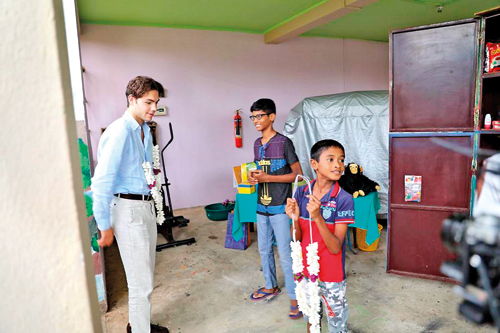First steps in building a legacy for his siblings

Emotional experience: David meeting survivors of the Easter Sunday attacks
It’s been 15 days since David Linsey arrived in Sri Lanka. In that time he has met the President, the Prime Minister and the Minister of Health; he has shaken hands with Father Jude at St. Anthony’s Church, sought funding and allies among the business community, and sat at a round table with doctors representing the country’s hospitals. He was also in a room with 150 people who share his grief.
David’s siblings Daniel and Amelie were among the hundreds who lost their lives in the Easter Sunday Attacks. Less than four months later, David was in Sri Lanka, on his first visit to the country. He was here, he said, to pay his respects to his family, but also to build the kind of legacy he believed they would have wanted.
In person, David is reserved yet articulate, someone who knows exactly what he wants to say, not least because he has had to repeat himself so many times over. A student at the University of Oxford, he took the year off to establish the ‘Amelie and Daniel Linsey Foundation.’ Since then, he’s had to handle the spectrum from media to ministers and well-wishers, many of whom never really knew his siblings. He speaks with his parents every day, but knows that he represents his family here. “I am their faces as well now,” he says of Daniel and Amelie. “And I suppose what my family is trying to do to remember them. Everything we are working toward is a reflection of who they were.”
 At the gathering for the families of victims of their attacks which David attended, he met the doctor who had treated Daniel in the hospital. David knew there was nothing the doctor could have done to help his brother, and appreciated that the medical professional had gone out of his way to escort David’s shell shocked father to the American embassy. It was just one in a series of encounters.
At the gathering for the families of victims of their attacks which David attended, he met the doctor who had treated Daniel in the hospital. David knew there was nothing the doctor could have done to help his brother, and appreciated that the medical professional had gone out of his way to escort David’s shell shocked father to the American embassy. It was just one in a series of encounters.
In general, meeting survivors was emotional says David, who is still struggling with his own loss. Strangers coming up to him, trying to express their shock and grief, could have proved overwhelming, instead, David has chosen compassion. “When you give comfort, you receive comfort yourself,” he says. “I wanted to try to be strong, and I realised that strength can come from helping other people.”
His visit to Sri Lanka, just four months after the attacks, has really been something of a fact finding mission. A chance, he says, to understand how the country works and where their investments will prove most useful. His time has been split between high level meetings and visits to potential sites, where with local partners, they hope to do some good.
David feels a huge responsibility to the private donors who have poured their money into the Foundation – a key concern has been in ensuring that they are working where they are most needed, he says, observing that much of the money that has come in has gone directly to victims of the bombings. While that was much needed, he would like to ensure that efforts don’t overlap and that each rupee is made the most of.
In this spirit, the Foundation brought down the reputed trauma surgeon Dr. Tarek Razek, who is the current Director of the Adult Trauma Programme at the McGill University Health Centre (MUHC) in Canada. As the current chair for the Canadian Network for International Surgery (CNIS), Dr.Razek’s focus has been on developing surgical capacity (trauma, emergency surgery and obstetric skills) with comprehensive educational programmes and supporting the creation of injury control centres and injury databases.
In Sri Lanka, the surgeon met with local doctors and directors of various hospitals to discuss how a well-organized trauma system could help doctors collaborate more effectively as a team, and how a regional trauma system could be established to single out hospitals with particular specialities, thereby allowing ambulance drivers, for instance, to transport patients to the places best equipped to help them.
David finds this is exactly the kind of programme—anchored in local leadership and building on local expertise—that he wanted to see the Foundation implement. To his mind, it is also critical that these solutions are in place to help Sri Lankans survive everyday challenges such as road accidents and not solely in the midst of catastrophes like the bomb blasts.“We are here for the long-term,” he says adding that they want to ensure they don’t just throw money at the problem but implement practical solutions.
David will head home this week, to his parents who are eager to have him back. Once in London, the Foundation team plans to carefully evaluate their strategy before making formal commitments. David says that Dr.Razek is likely to be back early next year to take the programme forward.
For David, coming to Sri Lanka was very much about walking the talk. “One of the biggest reasons behind my coming here was to show people that it is safe,” he says, hoping it will be taken as it was intended, a sign that fear only serves to divide us. For his part, David is doing his best to carry the spirit of his beloved siblings forward. “It’s been a cathartic experience for me in Sri Lanka,” he says, “and now it is exciting to see our work here becoming a reality.”


